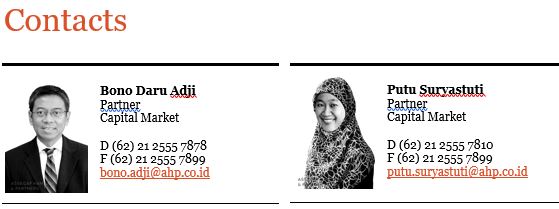OJK Issues New Rule on Merger or Consolidation of Public Companies
On 23 December 2016, the Financial Services Authority (Otoritas Jasa Keuangan / “OJK“) issued OJK Regulation No. 74/POJK.04/2016 on the Merger or Consolidation of Public Companies (the “New Rule“). The New Rule, which revokes Bapepam Rule No. IX.G.1 on the Merger or Consolidation of Public Companies or Issuers (“Rule IX.G.1“),1 is aimed at simplifying the rules governing mergers or consolidations, and improving the quality of information disclosure. As such, it expands the information that must be contained in the disclosure so as to include the following:
- disclosure of the new controlling shareholders resulting from the merger or consolidation;
- additional information on changes in core business.
If the merger or consolidation results in a change in the Public Company’s core business, the Merger or Consolidation Plan should provide relevant information on such change, including (i) a summary of the feasibility study, (ii) the reasons and considerations underlying the change in core business and a description thereof, and (iii) a description of the effects of the change in core business on the Public Company’s financial condition. These requirements are in line with the prevailing capital markets regulation on changes in core business.
Besides the additional information to be disclosed in the Merger or Consolidation Plan, the New Rule clarifies the requirements in the case of a the merger or consolidation involving a Public Company and one of its subsidiaries whose financial statements are consolidated with those of the Public Company and which is 100 percent directly owned by the Public Company. In such a merger or consolidation, the New Rule provides exemptions from the requirements as regards (i) the procedures for converting shares, (ii) pro forma financial information, (iii) summary of the appraisal reports on the shares of each company; and (iv) summary of appraisal report on the merger or consolidation.
Consistent with other OJK regulations on means of disclosure, under the New Rule the Abridged Merger or Consolidation Plan must be announced in (i) a newspaper or on the IDX’s website and the company’s website no later than thirty days prior to the date of the invitation to the general meeting of shareholders.
The New Rule also requires public companies to submit responses to OJK queries no later than ten business days after receiving the pertinent OJK request and to announce additional information at the latest two business days prior to the convening of the general meeting of shareholders.
The outcome of a merger or consolidation should be reported to the OJK not later than five business days subsequent to the date of effectiveness of the merger or consolidation statement.
AHP Commentary
The New Rule incorporates a number of significant differences from the previous regulation, including as regards (i) the additional information that should be disclosed in the Abridged Merger or Consolidation Plan; (ii) the disclosure of information when a change in control or change in core business will result from the merger or consolidation; (iii) the supporting documents that should be submitted as part of the Merger or Consolidation Statement; and (iv) reporting obligations.
Although the New Rule has clarified several requirements of the previous regulation, such as the provisions on whether an appraisal is required for a merger between a public company and its wholly owned subsidiary, it fails to address issues related to the price and timing of a share buyback in the event that there are dissenting shareholders who do not agree with the proposed merger or consolidation.
_____________________________________________________________________
i. Bapepam-LK Chairman’s Directive No. Kep-52/PM/1997 dated 26 December 1997

***
AHP Client Alert is a publication of Assegaf Hamzah & Partners. It brings an overview of selected Indonesian laws and regulations to the attention of clients but is not intended to be viewed or relied upon as legal advice. Clients should seek advice of qualified Indonesian legal practitioners with respect to the precise effect of the laws and regulations referred to in AHP Client Alert. Whilst care has been taken in the preparation of AHP Client Alert, no warranty is given as to the accuracy of the information it contains and no liability is accepted for any statement, opinion, error or omission.

